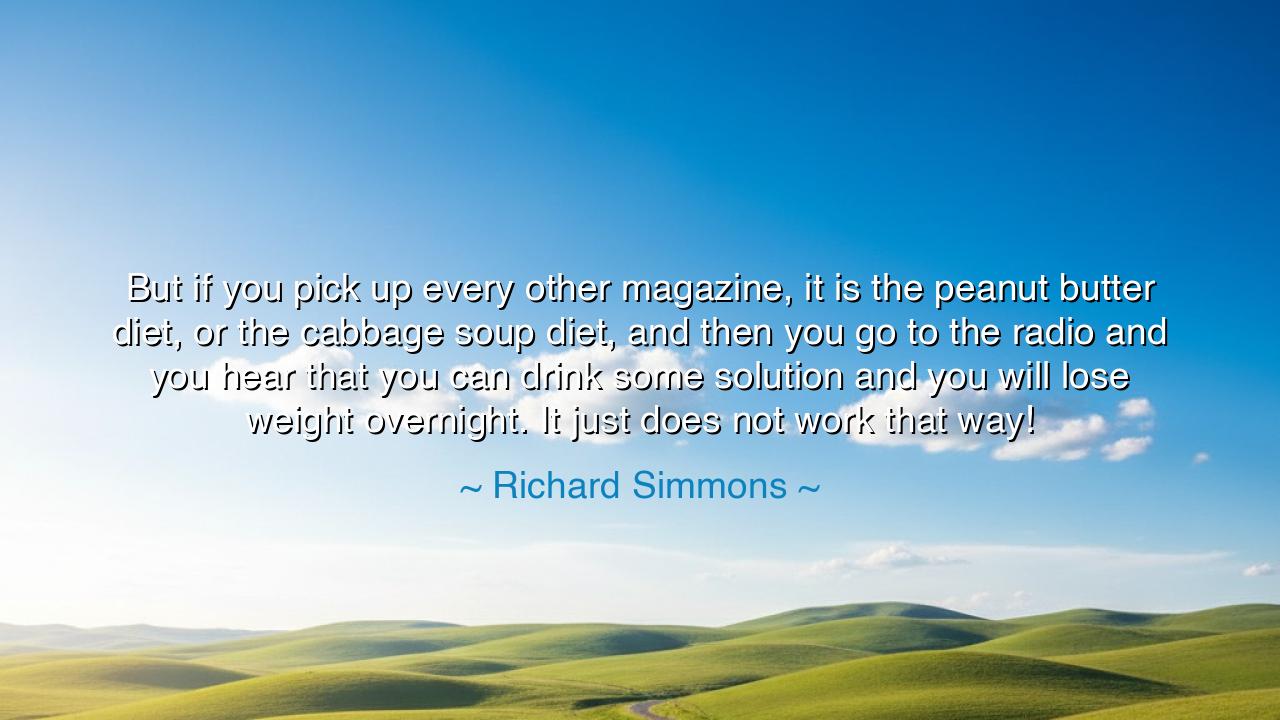
But if you pick up every other magazine, it is the peanut butter
But if you pick up every other magazine, it is the peanut butter diet, or the cabbage soup diet, and then you go to the radio and you hear that you can drink some solution and you will lose weight overnight. It just does not work that way!






In the fiery and heartfelt words of Richard Simmons, we hear the voice of one who has long wrestled with the illusions of false promise: “But if you pick up every other magazine, it is the peanut butter diet, or the cabbage soup diet, and then you go to the radio and you hear that you can drink some solution and you will lose weight overnight. It just does not work that way!” His tone is not of scorn, but of deep compassion—of one who has walked the long road of struggle and seen how easily the weary soul can be deceived by the mirage of instant change. Beneath these words lies a timeless truth: that there are no shortcuts to transformation, that the journey toward health, strength, or peace must be traveled with patience, discipline, and faith.
Simmons speaks to a world addicted to quickness—to the promise of miracles in a bottle, of effort replaced by convenience. Yet he reminds us, as the ancients often did, that anything worth attaining demands endurance. Just as the seed cannot bloom overnight, nor the mountain be climbed without sweat, so too the body cannot be transformed by trickery. The “peanut butter diet” and “cabbage soup diet”, the strange potions and “overnight” cures—all are symbols of the same human impatience, the desire to reap without sowing. His cry—“It just does not work that way!”—is not only a warning but a call to awaken, to return to the simple and honest path of steady labor and mindful living.
The ancient Greeks had a word for this folly: hubris—the arrogance of trying to defy nature’s laws. They knew that to seek results without respect for process was to invite ruin. In the tale of Icarus, the youth who flew too close to the sun on wings of wax, we find the same warning. Eager for glory, Icarus ignored the limits set for his safety, and his ambition melted in the heat of his haste. So it is with those who chase miracle diets or instant cures. They rise quickly on false wings, only to fall harder when truth and nature reclaim their due. Richard Simmons, in his modern way, plays the part of Daedalus—the wise father calling out to the reckless son, pleading for patience, urging him to stay within the bounds of wisdom.
His words also echo the moral of another ancient truth: the virtue of discipline. The philosopher Aristotle taught that excellence is not an act, but a habit—something built day by day through consistent effort. Simmons’ own life stands as living proof of this teaching. He rose not through secret formulas or fad diets, but through dedication, movement, and compassion. He taught the world that health is not found in deprivation, but in balance—in learning to love the process as much as the result. Those who followed him did not find miracles in a week; they found, over time, a renewal of spirit. And that, he knew, was the only miracle that truly mattered.
Yet Simmons also speaks to a deeper hunger—the hunger not for food, but for hope. The endless tide of magazines and radio ads he mentions are not born of evil, but of this human longing to be healed quickly, to be whole again. Many who chase these diets do so not out of vanity, but out of pain. They want to feel worthy, seen, beautiful, alive. Simmons understood this pain, for he too had once been lost within it. His warning, therefore, is not condemnation but compassion. He calls out to the lost not to mock them, but to guide them—to lead them back to truth, to patience, and to the healing power of effort and self-love.
Throughout history, the wise have warned against the lure of false promises. In the time of Hippocrates, the father of medicine, the same struggle existed. Charlatans sold elixirs claiming to cure all ills, while Hippocrates taught that true health came not from potions but from balance—from a life lived in harmony with nature, diet, and discipline. “Let food be thy medicine,” he said, meaning that nourishment, both physical and spiritual, is found in the everyday, not in the extraordinary. Simmons continues this lineage of truth-tellers, urging us to return to what is real and enduring.
The lesson in his words is clear and unshakable: there is no shortcut to transformation. The body, like the spirit, demands consistency, patience, and love. Reject the noise of quick cures and miracle solutions. Instead, walk the honest path—the path of movement, moderation, and mindfulness. Feed your body not with extremes, but with steadiness. Feed your heart not with desperation, but with courage. For in the rhythm of daily effort, the soul becomes strong, and the miracle you sought in haste unfolds slowly, beautifully, and lastingly.
So let us remember Richard Simmons’ wisdom, as the ancients would have written it in stone: Nothing true is gained without time, and nothing lasting is built without care. The fire that burns too fast dies to ashes, but the steady flame lights the ages. Eat wisely, live patiently, move joyfully, and trust the slow power of your own becoming. For the laws of nature—and of the soul—cannot be cheated. They can only be honored.






AAdministratorAdministrator
Welcome, honored guests. Please leave a comment, we will respond soon